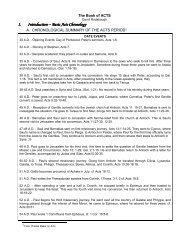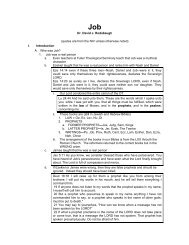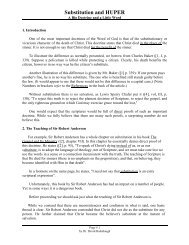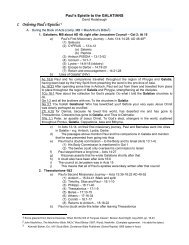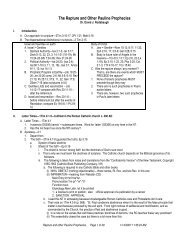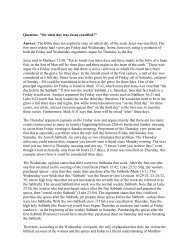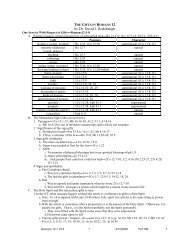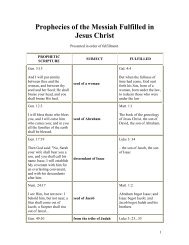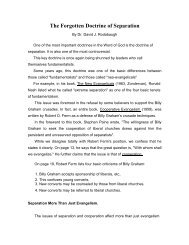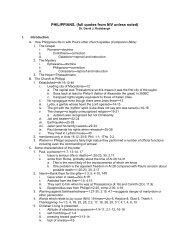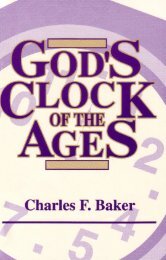Download - Hope of the Glory
Download - Hope of the Glory
Download - Hope of the Glory
You also want an ePaper? Increase the reach of your titles
YUMPU automatically turns print PDFs into web optimized ePapers that Google loves.
Selected Bible Treasures - 31 -<br />
- 32 -<br />
Selected Bible Treasures<br />
direct pro<strong>of</strong> <strong>of</strong> this doctrine. He states ([2], p. 95),<br />
"To speak <strong>of</strong> Christ's dying instead <strong>of</strong> us, or as our<br />
substitute, is to adopt <strong>the</strong> language <strong>of</strong> <strong>the</strong>ology, not <strong>of</strong><br />
Scripture, and we must take care lest we use <strong>the</strong><br />
words in a sense or a connection inconsistent with <strong>the</strong><br />
truth, The teaching <strong>of</strong> Scripture is that He died for<br />
sinners (<strong>the</strong>re is no emphasis on <strong>the</strong> preposition), and<br />
that, on believing, <strong>the</strong>y become identified with Him in<br />
that death"<br />
In a footnote on <strong>the</strong> same page, he states, "I need not say<br />
that substitution is an extra scriptural expression"<br />
Unfortunately, this book by Sir Robert Anderson has had<br />
an impact on a number <strong>of</strong> people. Yet in some ways it<br />
is a dangerous book.<br />
Before proceeding we should ask just what is <strong>the</strong><br />
teaching <strong>of</strong> Sir Robert Anderson.<br />
While we contend that <strong>the</strong>re are inconsistencies and<br />
confusion in what is said, one basic thread is clear. Sir<br />
Robert Anderson contended that Christ did not die as<br />
<strong>the</strong> substitute for any person. He fur<strong>the</strong>r claimed that<br />
Christ became <strong>the</strong> believer's substitute at <strong>the</strong> instant<br />
<strong>of</strong> salvation.<br />
On such a central issue as this, we might wonder what<br />
arguments he used. Sir Robert Anderson claims to<br />
<strong>of</strong>fer, "first a positive statement <strong>of</strong> <strong>the</strong> truth upon this<br />
subject, as it is unfolded in <strong>the</strong> types <strong>of</strong> <strong>the</strong> Old<br />
Testament and in <strong>the</strong> doctrinal teaching <strong>of</strong> <strong>the</strong> New,"<br />
([2], p. 88),<br />
He <strong>the</strong>n proceeds to base his argument on his<br />
understanding <strong>of</strong> types and his understanding <strong>of</strong> <strong>the</strong><br />
Greek word huper, He does not give direct support<br />
from <strong>the</strong> New Testament although <strong>the</strong> above might<br />
lead us to expect that. Instead he tries to argue from<br />
his position in favor <strong>of</strong> what we call Unlimited<br />
Redemption,<br />
a. Types and Sir Robert Anderson<br />
The subject <strong>of</strong> types is very interesting and important. It<br />
is full <strong>of</strong> many illustrations <strong>of</strong> <strong>the</strong> truth <strong>of</strong> God.<br />
But, a type must never be <strong>the</strong> primary basis for a<br />
doctrine. We must first learn <strong>the</strong> doctrine precisely<br />
and <strong>the</strong>n <strong>the</strong> type becomes an illustration, Too <strong>of</strong>ten,<br />
a type is interpreted a certain way and this is <strong>the</strong>n <strong>the</strong><br />
basis for some (possibly strange) doctrinal position.<br />
Such reasoning is wrong. We must search <strong>the</strong> scriptures<br />
for <strong>the</strong>ir teaching on a subject. Only after such a<br />
foundation are we in a position to study <strong>the</strong> types<br />
related to that doctrine.<br />
Sir Robert Anderson's argument from types is clearly<br />
presented ([2], p. 91) where he states:<br />
"And <strong>the</strong> way to follow aright <strong>the</strong> teaching <strong>of</strong> <strong>the</strong> types is<br />
to regard <strong>the</strong>ir historical sequence as marking <strong>the</strong>ir<br />
moral order. We thus learn <strong>the</strong> different aspects <strong>of</strong> <strong>the</strong><br />
death <strong>of</strong> Christ, and <strong>the</strong> divine order <strong>of</strong> <strong>the</strong> truth<br />
concerning it . According to <strong>the</strong> analogy <strong>of</strong> <strong>the</strong> great<br />
day <strong>of</strong> atonement, <strong>the</strong> tw<strong>of</strong>old aspect <strong>of</strong> <strong>the</strong> great day<br />
<strong>of</strong> atonement, <strong>the</strong> tw<strong>of</strong>old aspect <strong>of</strong> <strong>the</strong> same <strong>of</strong>fering<br />
is presented by two victims, <strong>the</strong> one being killed, <strong>the</strong><br />
o<strong>the</strong>r sent out <strong>of</strong> sight."<br />
This is clearly argument from type. The fact that he<br />
presents it first is dangerous in any teaching. The fact<br />
that he states, as we quoted above, that, "substitution<br />
is an extra scriptural expression," shows that this is<br />
his only argument. And, that is scary.<br />
While it is not our purpose to pursue <strong>the</strong> matter here,<br />
suffice it to say that we do not accept Sir Robert<br />
Anderson's explanation <strong>of</strong> types.<br />
In summary we state that proper doctrine is <strong>the</strong> basis <strong>of</strong><br />
<strong>the</strong> study <strong>of</strong> types; <strong>the</strong> study <strong>of</strong> types is not <strong>the</strong> basis<br />
<strong>of</strong> proper doctrine.<br />
b. <strong>the</strong> word huper and Sir Robert Anderson<br />
Certainly, any reader familiar with God's Word would



